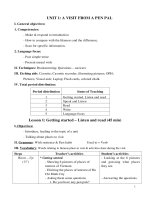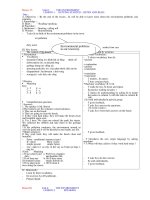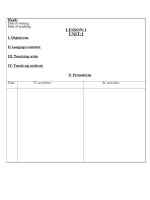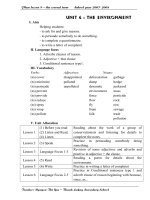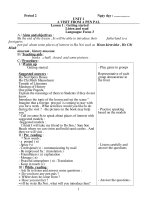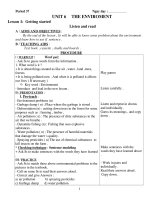Giao an Anh 9 tinh Bac Giang
Bạn đang xem bản rút gọn của tài liệu. Xem và tải ngay bản đầy đủ của tài liệu tại đây (278.17 KB, 28 trang )
Giáo án Anh 9 – Nguyễn Hữu Kiên – THCS Tiên Hưng
Week: 23. Date of making: 26/02/2008
Period: 45. Date of teaching: 30/02/2008
Unit 07: saving energy.
Lesson: 4 Read + Language focus 1,2
I) the aims:
1) Objectives:
- Helps students know some vocabulary about the first-aids.
- By the end of the lesson, students will able to read the text .
2) Teaching points: Read the text .
3) Preparation: Teacher’s: Lesson plan, textbook, picture.
Students': Textbook, notebook, and reference book.
II) Procedures:
1) Organization: (1-2 )’ - Good afternoon! Sit down, please!
- What’s the date today?
2) Checking up and warm up (5-7'):
Questions Answers
+ Checking up:
S1: Write vocabulary in last period.
S2: Summarize the listening text.
+ Warm up:
Have you ever seen anyone: faint? Go into shock? Get
burned?
What did you do?
- Do the exercise.
- Answers the
questions.
3) New lesson (30-35'):
Teacher’s activities T Sts’ activities
* Pre-teach:
- (to) faint: ngÊt xØu (Trans).
- chilled (adj): c¶m l¹nh (Exp).
- (to) elevate: n©ng lªn (Exp).
- (to) revise: phôc håi (Trans).
- (to) be in shock: bÞ xèc (Exp).
+ Check vocabulary: Slap the board.
* Pre-reading:
T/F statement prediction:
1. When someone has fainted, asks him/ her to sit or
stand.
2. When someone has got a burn cool the burn down
with ice.
3. When someone has got a shock, give him/ her
something to drink.
- Asks them to give the answers.
* While-reading:
- Asks them to open the textbook and read, then check
their prediction.
1. F, 2. T, 3. F.
a) Matching:
- Asks students to do the exercise .
A) Fainting B) Shock.
C) Burns. D) Fainting.
07'
05'
10'
05'
- Listen
- Listen and
repeat.
- Copy down.
- Look at the
poster and predict
for the sentences.
- Open the
textbook and read,
then checks their
prediction.
- Do the exercise
Giáo án Anh 9 – Nguyễn Hữu Kiên – THCS Tiên Hưng
E) Fainting.
- Checks their answers.
b) Gap-fill.:
- Asks students to read the text again and complete the
sentences.
1. If someone faints, it is important to leave the patient
lying f...................
2. It is not good for patient to s...........when he faints.
3. We should give the fainting victim a cup of tea when
he r.......................
4. When we are in s............we should not eat or drink.
5. C.........water and s...................
- Checks their answers.
* Post-reading:
- Asks students to play a role, S1's child has just had an
injury, S2 gives advice to student 1 what to do.
- Listens and checks their dialogue.
05'
03'
- Do the Gap-fill.
1. flat.
2. sit/ stand.
3. revise.
4. shock.
5. cold/ soap.
- Play a role.
4) Consolidation (2-3 ):’
- Asks a good student to translate the text in Vietnamese.
5) Homework (1-2 ):’
- Do the exercises 1 in students' exercise's book.
- Prepare new lesson.
Week: 23. Date of making: 28/02/2008
Period: 46. Date of teaching: 01/3/2008
Unit 07: saving energy.
Lesson: 5 Write.
I) the aims:
1) Objectives:
- Helps students know some vocabulary about the first-aids.
- By the end of the lesson, students will able to write a thank letter to friends.
- They have a chance to write a letter.
2) Teaching points: Write a thank letter.
3) Preparation: Teacher’s: Lesson plan, textbook, overhead.
Students': Textbook, notebook, and reference book.
II) Procedures:
1) Organization: (1-2 )’ - Good afternoon! Sit down, please!
- What’s the date today?
2) Checking up and warm up (5-7'):
Questions Answers
+ Checking up:
- Gives the cases and asks students to give
suggestions for the first-aids.
a) Your friend has fainted.
b) Your mother has burned herself.
c) Your friend is in shock.
d) Your friend cuts her hand.
1. Don't force him to stand.
2. Give her ice or cold water pack.
3. ..................................
4. ..................................
- Checks and gives them marks.
Giáo án Anh 9 – Nguyễn Hữu Kiên – THCS Tiên Hưng
3) New lesson (30-35'):
1. was. 2. were.
3. helped. 4. came.
5. am. 6. will phone.
- Asks students to compare and gives the answers.
b) Write a thank you letter to a friend who has given a
present and invite their friend to go on a picnic. Use the
questions as a guide.
Dear Phuong.
Thank you very much for the books you sent me while I
treated my disease at home. They were very interesting
and helped me relax a lot. I loved reading them very
much.
Now I have got over and felt very sad. I want to go out to
enjoy the fresh air. Do you want to go on picnic with me
this Sunday? If yes, I'll come and pick you up.
I am looking forwards to hearing from you.
Your friend.
Nam.
- Asks them to give the letter, checks their group letter.
c) Do the exercise 3.
- Asks students to work in group of 4. use the same
format to write another letter to another friend for the
other occasions.
- Limits the time for students to write the letter.
* Post-writing:
+ Discussion:
- Asks students to ask one or two groups questions about
their letters.
12'
07'
04'
- Compare and
gives the answers.
- Do the exercise
3.
- Work in group of
4 uses the same
format to write
another letter to
another friend for
the other
occasions.
4) Consolidation (2-3 ):’
- Asks a good student to give the good letter for the class and hang them on the overhead.
5) Homework (1-2 ):’
- Write a letter to a friend.
- Prepare new lesson.
Giáo án Anh 9 – Nguyễn Hữu Kiên – THCS Tiên Hưng
Week: 24. Date of making: 02/3/2008
Period: 47 Date of teaching: 06/3/2008
ÔN TẬP
I) the aims:
1) Objectives:
- Helps students know some vocabulary about the computer.
- By the end of the lesson, students will be able to practice doing some exercise
- They have a chance to do some kind of exercises.
2) Teaching points: Comparison of present perfect and simple present.
3) Preparation: Teacher’s: Lesson plan, text book and overhead.
Student’s: Text book, notebook, reference book.
II) Procedures:
1) Organization: (1 )’ - Good afternoon! Sit down, please!
- What’s the date today?
2) Checking up and warm up (7'):
Questions Answers
- Asks students to:
+ Retell the use of the present perfect tense:
+ Retell the use of the present and past simple
tense:
- Students retell.
3) New lesson (30'):
Teacher’s activities T Sts’ activities
- Asks students to do the exercise 3 (Page 146):
a) Finished action.
b) Incomplete action.
c) Finished action.
d) Incomplete action.
e) Finished action.
f) Finished action.
g) Incomplete action.
- Asks students to do the exercise
1) Have you seen. 6) was happened.
2) did you live/ lived. 7) have had
3) have not had. 8) felt.
4) have been. 9) broke.
5) Did you hear.. 10) Have the plane arrived...?
* Find someone who....?
Name When?
1, ...............has visited HCM
museum.
2, ................has been HL Bay.
3, ............has bought a new pen.
4, ............has seen the film
Jurassic Park.
*Questions:
- Have you ....................?
- When did you ..................? or When were you .........?
+ Write it up:
Example:
5'
5'
5'
5'
- Do the exercise .
- Do the exercise.
- Go around the
class and ask these
questions, write
down the name of
the person he/she
answers "Yes".
Giáo án Anh 9 – Nguyễn Hữu Kiên – THCS Tiên Hưng
Hoa has visited HCM museum.
She was there last summer.
* Presentation:
Dialogue to make model sentences.
Mum:
Have you finished your homework yet, Ba?
Ba:
Yes, I have already done it.
Mum:
And have you tidied your room yet?
Ba:
No, I haven't tidied it yet.
S + have/has + already + PII ....
S + have/ has + PII .........+ yet.
* Practice:
- Asks students to complete the dialogue between Ba and
his mother
- Asks students to work in pairs, ask and answer the
questions about the flights
5'
5'
- Write it up.
- Listen to the
teacher and then
make the dialogue.
- Give the model
sentences.
- Complete the
dialogue between
Ba and his mother
- Work in pairs,
ask and answer the
questions about
the flights
4) Consolidation (4 ):’
- What have you studied about to day?
5) Homework (3 ):’
- Asks students to learn by heart the lesson.
- Prepare new lesson
Week: 24. Date of making: 04/3/2008
Period: 48 Date of teaching: 08/3/2008
Test 45 minutes
I – Put the verbs in correct form: (2 marks)
1. When I (see) you yestesday, you were sitting in the cafe.
=> . .…………… ……… ………
2. You (come) here if you are free, won’t you?
=> ..…………………………………
3. I wish she (finish) her test on time.
=> . .…………… ……………………
4. They suggested (go) to the cinema.
=> . .…………… ……………………
II – Choose the best answer: (4 marks)
1. They will hold Olympic ................... Beijing, China.
a. from b. in c. at d. on
2. I can't go to the movies with you if it .................... heavily.
a. rain b. rains c. rained d. raining
3. He wishes he ..................... English well.
a. learns b. can learn c. learnt d. will learn
4. The children suggested ....................... part in the outdoor activities.
a. take b. to take c. taking d. taken
5. He can't earn money ................. he has no job.
a. unless b. until c. if d. without
6. You forgot to post my letter, ...................?
a. do you b. don't you c. did you d. didn't you
7. They failed the exam, ......................?
a. they did b. they didn't c. did they d. didn't they
Giáo án Anh 9 – Nguyễn Hữu Kiên – THCS Tiên Hưng
8. We haven't seen them .............. they went abroad.
a. since b. when c. while d. what
III – Rewrite: (2 marks)
1. It is a pity that I have to work tomorrow.
=> I wish ..........................................................................................
2. “Are you going to the movies tonight, Phuong?" said Long.
=> Long asked ............... ...................................................................
3. "Why don't you give up that job?" said Smith.
=> Smith suggested ........ ..................................................................
4. They have sent her a small gift.
=> She .......................................................…………………………
IV – Arrange: (2 marks)
1. walking / school / she / to / suggested / in the morning.
=> ..…………………………………………………………………
2. for / he / played / a long time / hasn’t / soccer.
=> ..…………………………………………………………………
3. it / we / go picnic / if / rains / will not.
=> ..…………………………………………………………………
4. listening / they / to / suggested / jazz music.
=> ..…………………………………………………………………
Đáp án:
I – (2 điểm)
1. saw 3. finished
2. will come 4. going
II - (4 điểm)
1. b 2. b 3. c 4. c 5. c 6. d 7. c 8. a
III - (2 điểm)
1. I wish I didn’t have to ..……
2. Long asked Phoung if she was going to the movies that night.
3. Smith suggested giving up that job.
4. She has been sent a small gift.
IV – Arrange:(2 điểm)
1. She suggested walking to school in the morning.
2. He hasn’t played soccer for a long time.
3. If it rains we will not go picnic.
4. They suggested listening to jazz music.
Week: 25 Date of making: 09/3/2008
Period: 49 Date of teaching: 13/3/2008
unit 8 celebrations.
Lesson: 1 Getting started - Listen and read.
I) the aims:
1) Objectives:
- Helps students know some vocabulary about the invention.
- By the end of the lesson, students will be able to practice skills.
- They have a chance to listen and read.
2) Teaching points: Passive voice in present simple.
3) Preparation: Teacher’s: Lesson plan, text book and overhead.
Student’s: Text book, notebook, reference book.
II) Procedures:
Giáo án Anh 9 – Nguyễn Hữu Kiên – THCS Tiên Hưng
1) Organization: (1 )’ - Good afternoon! Sit down, please!
- What’s the date today?
2) Checking up and warm up (15'):
Questions Answers
- Asks students to talk about the process of
producing chocolate.
- Using the picture of a telephone, giving some
questions:
+ When was it invented?
+ Who was it invented by?
+ What was his nationality?
- Talk in the class.
- Look at the picture and answer
these questions.
3) New lesson (30'):
Teacher’s activities T Sts’ activities
* Pre-teach:
- (to) crush: NghiÒn n¸t.
- (to) liquify: Lµm cho thµnh níc.
- mold (n): C¸i khu«n ®óc.
- conveyor (n): B¨ng t¶i.
+ Check: Slap the board.
- Uses a white sheet pf paper and asks some questions:
. What is it made of?
. What do people use it for?
. Did they use it to write long time ago?
. What did they write on?
- Asks students to match the sentences with the picture.
* Practice:
- Asks students to practice the dialogue with a partner.
- Asks students to match the half-sentences:
* Production:
Speaking:
- Asks students to describe process of producing
chocolate.
Cocoa beans => 1 wash => 2 weigh => 3 cook => 4
crush => 5 liquify => 6 add with butter, sugar, vanilla
milk => 7 grind => 8 roll => 9 pour into mold => 10
chocolate.
5'
2'
5'
8'
- Listen three
times.
- Listen and
repeat.
- Read
individually.
- Copy down all
the words.
- Play the
technique.
- Match the
sentences with the
picture.
- Practice the
dialogue with a
partner.
- Match the half-
sentences
- Speak to describe
process of
producing
chocolate.
4) Consolidation (4 ):’
- What have you studied about to day?
5) Homework (3 ):’
- Asks students to learn by heart the lesson.
- Prepare new lesson
Week: 25 Date of making: 11/3/2008
Period: 50 Date of teaching: 15/3/2008
unit 8 celebrations.
Giỏo ỏn Anh 9 Nguyn Hu Kiờn THCS Tiờn Hng
Lesson: 2 Speak + Listen
I) the aims:
1) Objectives:
- Helps students know some vocabulary about the invention.
- By the end of the lesson, students will be able to talk about the difference invention -
They have a chance to talk with their friends.
2) Teaching points: Talk about invention.
3) Preparation: Teachers: Lesson plan, text book and pictures, cassette.
Students: Text book, notebook, reference book.
II) Procedures:
1) Organization: (1 ) - Good afternoon! Sit down, please!
- Whats the date today?
2) Checking up and warm up (15'):
I) Nối câu hỏi ở cột A với câu trả lời ở cột B sao cho nghĩa phù hợp (5 điểm).
A B
1. What are you doing in your vacation?
2. What is your home town like?
3. How far is it from here to your home?
4. How do you usually get to your home?
5. Do you love your home town?
A. I usually travel by train.
B. I think its about 850 kilometers.
C. I am going to Ha Long Bay.
D. Oh, Yes. I really love it.
E. Its beautiful small village.
II) Viết lại các câu sau theo các từ gợi ý (5 điểm).
1. Have/ learnt/ for/ English/ I / 3 years.
2. Goes/ to/ she/ school/ bike/ by.
Key: 1.C; 2. E; 3. B; 4. A; 5. D.
1. I have learnt English for 3 years.
2. She goes to the school by bike.
3) New lesson (30'):
Teachers activities T Sts activities
* Model sentences:
A: Who was the telephone invented by?
B: It was invented by..............
A: When was it invented?
B: It was invented in...........
=> The passive voice in simple past.
S + was/were + PII
* Practice:
- Asks students to complete the table completing.
1 Printing press. 2. 1810
3. Bicycle 3. German.
4. 1843 5. Alexander Bain 6. English.
7. Sawing machine
8. F.J. Monier 9. French.
10. D.E. Hughes 11. American.
12. Wilhelm Konarad. 13. German.
14. 1939. 15. American.
16. Optical fiber.
- Asks students to report activity.
- Calls pairs by pairs of student to talk about these
activities.
8'
12'
12'
- Listen to the
teacher and read in
chorus.
- Copy down the
structure.
- Complete the
table completing.
- Report activity.
- Talk about these
activities.
Giáo án Anh 9 – Nguyễn Hữu Kiên – THCS Tiên Hưng
Eg: The facsimile was invented by Alexander Bain in
1843.
4) Consolidation (4 ):’
- What have you studied about to day?
5) Homework (3 ):’
- Asks students to learn by heart the lesson.
- Prepare new lesson (Unit 16 Lesson 2 Speak)
Week: 26 Date of making: 18/3/2008
Period: 51 Date of teaching: 21/3/2008
Tr¶ vµ ch÷a bµi kiÓm tra
I) The aims:
1) Objectives:
- Helps students know his/ her mark.
- By the end of the lesson, students will be able to know how mark they have and what
they need to do in the future.
2) Teaching points: Recite students’ test paper.
3) Preparation: Teacher’s: Lesson plan, test papers, keys.
Students': Textbook, notebook, and reference book.
II) Procedures:
1) Organization: (1-2 ' ) - Good morning! Sit down, please!
- What’s the date today?
2) Checking up and warm up (15'):
Test 45 minutes
I) Read the passage and then tick T for true sentence and F for false sentences:
Well I like living in Glasgow, mainly because I live right in the center. If I want to go to
the theater, I can leave my house about 15 minutes before the show starts and walk there. I can
do the same with a cinema. On Sundays I often go to the park with my friends or visit a
museum or art gallery. Or I sometimes I go to the countryside with my parents and brother.
T/F
1. He lives in London.
2. He lives far from the city center.
3. He can walk to the nearest cinema.
4. He often goes to the park with his friends everyday.
5. He sometimes goes to the countryside with his parents.
II) Change the sentences into reported speech:
1. “What’s your favorite sport?” She asked me.
2. She said: “I liked the classical music”.
3. “How old are you?” Lan asked me.
4. My father said to me “I will give you a present for your birthday”
3) New lesson (15'):
Teacher’s activities T Sts’ activities
Keys: :
I) Mçi c©u ®óng ®îc 0,5 ®iÓm:
15’ - Listen.
- Give the right
Giáo án Anh 9 – Nguyễn Hữu Kiên – THCS Tiên Hưng
1. saw 2. will come 3 finished 4.going
II) Mçi c©u ®óng ®îc 0,5 ®iÓm:
1. b 2. b 3. c 4. c 5. c 6. d 7. c 8. a
III) Mçi c©u ®óng ®îc 0,5 ®iÓm:
1.I wishI didn’t have to ..……
2. Long asked Phoung if she was going to the movies
that night.
3. Smith suggested giving up that job.
4. She has been sent a small gift.
IV) Mçi c©u ®óng ®îc 0,5 ®iÓm:
1. She suggested walking to school in the
morning.
2. He hasn’t played soccer for a long time.
3. If it rains we will not go picnic.
4. They suggested listening to jazz music.
answers.
4) Consolidation (2-3'):
- Retell the main structure in the test.
5) Homework (1-2 ' ):
- Prepare for new lesson
Week: 26. Date of making: 18/03/2008
Period: 52. Date of teaching: 23/03/2008
Unit 8: Celebrations
Lesson 3: Read.
I) The aims:
1) Objectives:
- Helps students know some vocabulary about Celebrations
- By the end of the lesson, students will be able to know more about the opinions,
feelings, and memories of children about their father on the Father’s Day in the U. S. A and in
Australia.
- They have a chance to read English text.
2) Teaching points: Reading for details on Father’s Day.
3) Preparation: Teacher’s: Lesson plan, textbook, cassette and tape.
Students': Textbook, notebook, and reference book.
II) Procedures:
1) Organization: (1-2') - Good morning! Sit down, please!
- What’s the date today?
- Who’s absent today?
- How are you today?
2) Checking up and warm up (5-7'):
Questions Answers
* Table completion.
Celebration Date
1. Lunar New Year
1.1*
2. Valentine’s Day
14.2
3. International Women's Day
8.3
4. April Fool’s Day
1.4
5. Chidren's Day
1.6
6. May Day
1.5
7. Mid Fall Festival
15.8*
8. Teacher's Day
20.11
Giáo án Anh 9 – Nguyễn Hữu Kiên – THCS Tiên Hưng
9. People’s Army Founding Anniversary
22.12
10. Christmas
24.12
11. Victory Day
30.4
3) New lesson (30-35'):
Teacher’s activities T Sts’ activities
I) Vocabulary:
- (to) hug [hʌg]: «m chÆt (Explanation).
- considerate [kən'sidərit] (adj): ©n cÇn, chu ®¸o
(Translation).
- generous ['dʒenərəs] (adj): réng lîng (Translation).
- priority [prai'ɔrəti] (n): sù u tiªn, quyÒn u tiªn
(Translation).
- sense of humor: khiÕu hµi híc (Explanation).
- (to) distinguish [dis'tiηgwi∫] : ph©n biÖt, lµm cho kh¸c biÖt
(Translation).
- terrific [tə'rifik] (adj): tuyÖt vêi, kú diÖu (Explanation).
- groom [grum] (n): chó rÓ (Antonym).
* Pre-reading:
* On Father’s Day in Australia and in the U. S. A,
children show their love to their fathers by giving their
father presents, cards.
* While reading:
- Asks students to read the text silently in one or two
times.
- Do the T/F exercise.
1. Rita’s father teaches him how to love, cry and laugh.
2. Rita’s father loves him so much that no words can
describe.
3. Jane’s father cried on her wedding day.
4. Bob’s father is very mean.
- Asks students to answer these questions:
a. Who do you think Rita sends this card to?
- To her father.
b. Is Jane’s father alive or dead? How do you know this?
- He is possibly dead. These ideas may tell about that. “
How much you are missed, I now have children, Dad”
c. What quality makes Bob’s father different from
others?
- He is considerate, generous and humorous. His sense
of humor makes him different from others.
d. What image of a father can you draw from the three
passages?
- A father can be a teacher, a care taker and a friend.
* Post-reading:
- Asks students to discuss about their father with the
clues:
- Can you tell me about your father?
- How old is he?
- What does he do?
- What does he look like?
06’
04’
05’
10’
05’
- Listen
- Listen and
repeat.
- Copy down.
- Listen to the
teacher.
1. T
2. T
3. T
4. F: He is
considerate and
generous.
- Work in groups.
(4 groups).
